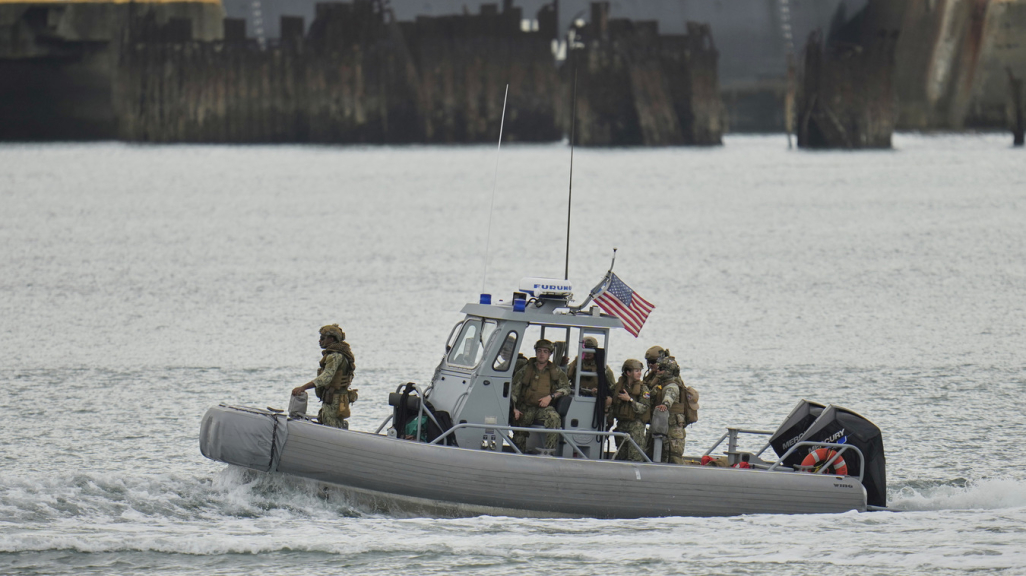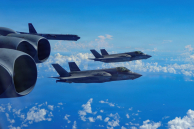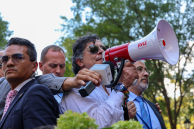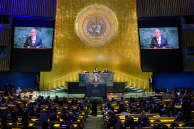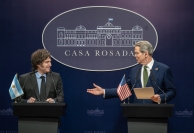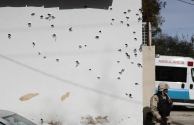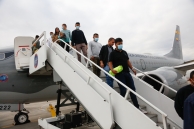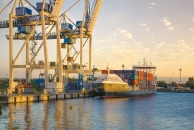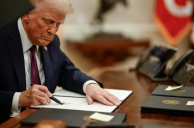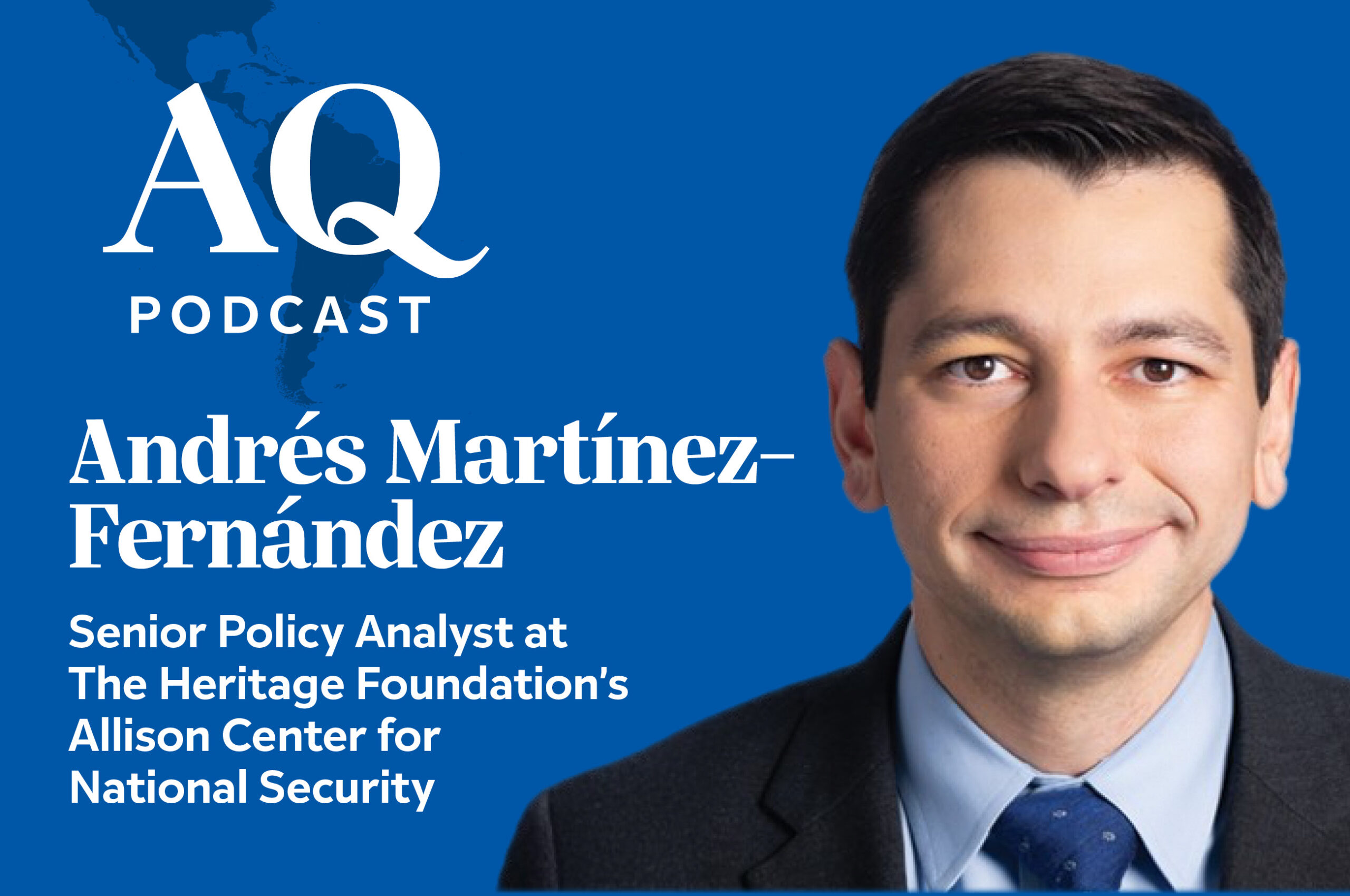Tracking Trump and Latin America: Security—Trump Blockades Sanctioned Venezuelan Oil
Tracking Trump and Latin America: Security—Trump Blockades Sanctioned Venezuelan Oil
How is the U.S. administration furthering its national security agenda in the Americas?
This piece was originally published on September 11, 2025. New content is regularly added. Khalea Robertson contributed to this article.
From a boost in U.S. troop numbers at the U.S.–Mexico border to an increased military presence in the southern Caribbean, security policy concerning Latin America rests high on the agenda of the second Trump administration.
Since he retook the reins of the presidency, U.S. President Donald Trump has focused on a marquee security goal in the Western Hemisphere: defeating drug cartels and other criminal groups. While campaigning back in December 2023, he declared, “The drug cartels are waging war on America—and it's now time for America to wage war on the cartels.” Since then, the Trump administration has leveraged both military might and legal tools, such as terrorist designations, to attempt to weaken organized crime groups.
AS/COA Online tracks the administration's approach to hemispheric security.
December 16: Clan del Golfo named Foreign Terrorist Organization; Trump implements blockade on sanctioned Venezuelan oil tankers
The Trump administration has added another Latin America-based group to the list of Foreign Terrorist Organizations (FTO). On December 16, Clan del Golfo, which operates out of Colombia, was named an FTO. According to the designation, “The group’s primary source of income is cocaine trafficking, which it uses to fund its violent activities. Clan del Golfo is responsible for terrorist attacks against public officials, law enforcement and military personnel, and civilians in Colombia.”
The moves comes just days after Colombian President Gustavo Petro signed an agreement with the group to advance demobilization of combatants.
Also on December 16, Trump ordered a full blockade of sanctioned oil tankers leaving and entering Venezuela, cutting off what he views as a financial lifeline for the Maduro administration. It is unknown how the U.S. military plans to enforce this action.
This comes the week after the U.S. military seized a sanctioned Venezuelan oil tanker off the country’s coast, in a move the Venezuelan regime called “blatant theft.”
December 15: Trump names fentanyl a “Weapon of Mass Destruction”
President Trump signed an executive order in the Oval Office on December 15 designating fentanyl, a narcotic, as a “weapon of mass destruction” (WMD).The order directs members of Trump’s cabinet to take increased action against the production and distribution of fentanyl.
The U.S. government has never categorized a drug as a WMD, though the label was used on nuclear weapons during the presidency of George W. Bush (2001-2009) and was employed to justify the invasion of Iraq.
A majority of fentanyl comes to the United States through Mexico. Efforts to stem the flow have been central to the relationship with Trump and Mexican President Claudia Sheinbaum.
December 12: Trump to name Peru a Major Non-NATO Ally
The Trump administration notified the Senate Foreign Relations Committee that it intends to name Peru as a “Major Non-NATO ally” to engender collaboration on counternarcotic efforts. The designation will give Peru broader economic and military privileges, such a purchasing equipment from the United States or participating in joint trainings.
Peru will join 19 countries, including Argentina, Brazil, and Colombia, as designees.
December 5: Consolidated U.S. military command launched with new general
The U.S. Southern Command, the Defense Department branch that oversees the Caribbean and Central and South America, will be merging with U.S. Army Forces Command and U.S. Army North into a single headquarters known as the U.S. Army Western Hemisphere Command or “West-Hemcom.” According to the Department of Defense, the move seeks to modernize the army and make it more agile. The Washington Post reported that the creation of the command is part of a larger strategy, directed by Defense Secretary Pete Hegseth, to reduce the number of commands worldwide.
The commander who will oversee this consolidated command is Joseph A. Ryan, who previously served as the Army’s deputy chief of staff for operations, plans, and training. One of the leaders Ryan replaces is Adm. Alvin Holsey, who retired from his role as head of U.S. Southern Command on December 12 after announcing his intent to step down in October.
December 4: U.S. National Security Strategy outlines approach to Western Hemisphere
The U.S. government released its annual National Security Strategy, which outlines the federal government’s priorities and approach to its foreign policy. The 2025 Strategy dedicates an entire section to the Western Hemisphere. Among the U.S. objectives in the region are preventing mass migration, undertaking counternarcotic efforts, stopping “foreign influence,” guaranteeing access to key geopolitical locations, and ensuring stable governance.
The document builds on language in a December 2 White House proclamation about “The Trump Corollary to the Monroe Doctrine,” a reference to the 1823 foreign policy principle upon which Washington gave itself the responsibility to oppose intervention and further colonization from Europe in the Americas. The new corollary, defined by the White House, says, “That the American people—not foreign nations nor globalist institutions—will always control their own destiny in our hemisphere.”
The National Security Strategy lays out a clear goal for the Trump administration: “The United States must be preeminent in the Western Hemisphere as a condition of our security and prosperity.” How? The National Security Strategy lays out an “Enlist and Expand” strategy that looks to work with existing allies and recruit new partners on solutions to transnational problems.
Other goals laid out in the document include “a readjustment of [the U.S.] global military presence” and the prioritization of “commercial diplomacy to strengthen [the U.S] economy and industries, using tariffs and reciprocal trade agreements as powerful tools.” There is a specific call for Washington to help countries in the Western Hemisphere develop strategic resources, with the National Security Council set to undertake a review around how the United States can aid in this effort. There is also a call to use the U.S. financial and technology sectors to engender cooperation.
The document also directly attempts to justify recent U.S. military strikes on alleged drug boats in the Caribbean, saying the military can use "targeted deployments to secure the border and defeat cartels, including where necessary the use of lethal force to replace the failed law enforcement-only strategy of the last several decades.”
December 1: Trump pardon frees convicted Honduran ex-President
On November 28, President Donald Trump announced he would pardon former President of Honduras Juan Orlando Hernández (2014–2022) of his 45-year drug trafficking sentence. In 2024, a federal court in New York convicted Hernández of accepting bribes from drug traffickers, protecting cartel members from extradition and prosecution, and moving at least 400 tons of cocaine to the United States. In his Truth Social post, which also included a reiterated endorsement of presidential candidates Nasry “Tito” Asfura, Trump said Hernández was “treated very harshly and unfairly.”
On December 1, Hernández was released from his prison cell in West Virginia. Senator Tim Kaine (D-VA), who is the top Democrat on the Senate Foreign Relations, condemned the pardon. “[Hernández] was the leader of one of the largest criminal enterprises that has ever been subject to a conviction in U.S. courts, and less than one year into his sentence, President Trump is pardoning him, suggesting that President Trump cares nothing about narcotrafficking,” he said.
November 26: During Hegseth visit, DR grants U.S. access to military base
Secretary of Defense Pete Hegseth made a one-day trip to the Dominican Republic on November 26 where he met with President Luis Abinader to announce a new bilateral military agreement. U.S. armed forces will now have temporary access to restricted part of a Dominican military air base and an international airport for use in refueling and transportation of aircrafts and personnel in the Caribbean, and at a time of heightened U.S. tensions with Venezuela. The move is the first major military cooperation agreement between the two countries. In the press conference, Hegseth praised the Dominican Republic for its counternarcotics efforts. “That’s why we decided to come here first,” Hegseth said. “The Dominican Republic has stepped up.”
A day earlier, the Chairman of the U.S. Joint Chiefs of Staff Dan Caine met with Prime Minister of Trinidad and Tobago Kamla Persad-Bissessar to discuss security. Persad-Bissessar confirmed days later that the U.S. military installed a radar system on the island of Tobago.
November 24: U.S. government designates Cartel de los Soles as a terrorist group
The U.S. government officially designated the Cartel de los Soles as a Foreign Terrorist Organization (FTO), alleging that the group is run by the regime of Nicolás Maduro and collaborates with the Sinaloa Cartel and the Tren de Aragua. Experts, however, have rejected the Trump administration’s categorization of the Cartel de los Soles, saying it is less of a formalized group with a command structure is and more of a shorthand term for a highly corrupt network within Venezuela’s armed forces engaged in drug smuggling.
This FTO designation builds on the U.S. government’s labelling the Cartel de los Soles as a Specially Designated Global Terrorist in July. (See previous entry)
With this new designation, the U.S. government has criminalized all support for the Cartel de los Soles and bars any affiliates from entering the United States. Defense Secretary Pete Hegseth said the FTO designation “brings a whole bunch of new options to the United States” regarding Venezuela.
The ouster of the Venezuelan strongman came amid an accumulation of military assets in the region and ongoing fatal strikes on alleged drug boats.
November 16: Ecuadorans vote against reestablishment of U.S. military bases
Voters in Ecuador delivered a blow to President Daniel Noboa’s security plans when 61 percent of Ecuadorans voted “no” on a referendum question of whether the constitutional ban on foreign military installations in the country should be lifted. Noboa had argued that a foreign military presence could help abate the surge in drug-related violence facing the country in recent years. Voters also rejected three other reforms on the November 16 ballot, which covered removing state financing for political campaigns, reducing the number of national legislators, and forming a constituent assembly to rewrite the Constitution.
Less than two weeks prior to the referendum vote, Noboa accompanied U.S. Secretary for Homeland Security Kristi Noem on a tour of military bases in the coastal cities of Manta and Salinas. This followed Secretary of State Marco Rubio’s September visit to Quito, in which he said Washington was “willing to consider” setting up a military base in Ecuador to “help with illegal mining, narcoterrorism, and illegal fishing” if invited.
Manta was once the site of a U.S. military base. But in 2008, then President Rafael Correa opted not to renew the security agreement. A new constitution approved by referendum that year prohibited the establishment of foreign military bases in Ecuador.
October 24: U.S. military deploys airline carrier to Caribbean after Pacific strikes
The U.S. military added an airline carrier to its deployment in the Caribbean. The carrier, which can hold more than 75 aircrafts, is one of just 11 of its type in the U.S. arsenal.
This action comes just days after the U.S. military struck and sank more two suspected drug trafficking boats. These two, however, were in the Pacific, expanding the territory of the ongoing campaign.
That same day, the Treasury Department announced it was sanctioning Colombian President Gustavo Petro and members of his family, as well as his interior minister, for their alleged role in the global illicit drug trade.
October 20: Trump cuts aid to Colombia after rift over boat strike
On Friday, October 18, U.S. troops sunk a boat it believed to be affiliated with a Colombian insurgency group, the National Liberation Army, known as the ELN. U.S. Defense Secretary Hegseth said the United States believed the boat was trafficking drugs. This was the first time the U.S. government associated its vessel attacks in the Caribbean with the ELN—an organization designated as a terrorist group in 1997, during the Clinton administration. The strike killed three men.
In response, Petro brought up his anger over a September strike by U.S. troops on a vessel that killed a Colombian man who he believes to have been a fisherman. He accused the United States of murder and of violating Colombia’s sovereignty.
On Sunday, Trump responded by calling Petro an “illegal drug leader” and said he would be halting U.S. aid to Colombia. In September, the Trump administration had decertified Colombia as a partner in the war on drugs but provided it a waiver so that aid could continue. This year, Colombia was slated to receive $400 million in aid. Trump also said he would announce high tariffs on Colombia.
Petro responded by recalling Colombia’s ambassador to the United States.
Sergio Guzmán of Colombia Risk Analysis speaks on the bilateral relationship as the Andean country’s 2026 elections approach.
October 16: Head of U.S. Southern Command steps down
Adm. Alvin Holsey, the head of U.S. Southern Command, will be leaving his post on December 12 after one year in the typically three-year position. No reason was stated for his departure.
As head of U.S. military operations in South America, Holsey has overseen the strikes against alleged narcotraffickers near Venezuela and the buildup of troops in the Caribbean.
October 15: Trump administration authorizes CIA action in Venezuela
The New York Times on Oct. 15 made public that President Donald Trump signed a document known as a “finding” that authorizes the U.S. Central Intelligence Agency (CIA) to conduct covert actions in Venezuela. Now, the U.S. spy agency can undertake lethal action in the South American country, as well as a range of other operations. Trump said that his government was considering strikes on the country, though no full plans have been made public.
The day before, the U.S. military conducted another strike off the coast of Venezuela, killing six people it said it suspects to be narcotraffickers. This is at least the fifth such strike.
October 6: Trump calls off diplomatic efforts with Maduro
After months of communication between Venezuelan leader Nicolás Maduro and U.S. Special Envoy Richard Grenell, President Trump has called off his country’s diplomatic outreach with Caracas. Grenell and Maduro have been engaged in negotiations since January on topics such as the repatriation of Venezuelan migrants, the release of U.S. prisoners, and the sale of oil.
Also on October 6, the Venezuelan regime warned the U.S. government that it had uncovered a plot to execute a terrorist attack on the U.S. embassy in Caracas, which it credited to extreme sectors of the right in Venezuela.
October 3: Trump administration claims another boat strike as it declares an “armed conflict”
U.S. Secretary of Defense Pete Hegseth announced that United States had sunk another boat it believes to part of narcotrafficking operations on October 3, at least the fourth strike of its nature, by releasing a video on social media showing the operation. Four were killed in the operation, bringing the total casualties from the boat strikes to 21.
The strike came the day after the Pentagon delivered a memo to Congress that called the alleged traffickers “unlawful combatants” and declared that the United States is in a “non-international armed conflict” with narcotraffickers. Since the first strike, Democratic lawmakers have requested that the Trump administration seek war power authority to continue the campaign, which would require a vote in the U.S. Senate.
The ouster of the Venezuelan strongman came amid an accumulation of military assets in the region and ongoing fatal strikes on alleged drug boats.
September 30: UN approves U.S.-proposed military force
A resolution, spearheaded by United States and Panama, to expand the multinational security support (MSS) mission in Haiti into a “gang suppression force”, passed the UN Security Council. The MSS, which ended on October 2, had 1,000 officers, mostly from Kenya, supporting the Haitian police. Now, the new force can have up to 5,500 uniformed personnel.
September 29: U.S. and Mexico launch anti-illicit firearms initiative
During the inaugural meeting of the U.S.-Mexico Security Implementation Group, the United States and Mexico launched an initiative that aims to hamper the illicit trafficking of firearms between the countries. Mexico will use more U.S.-produced tools to track firearms and both countries will expand their joint investigations, prosecutions, and intelligence sharing.
The U.S.-Mexico Security Implementation Group was formed earlier in September during Rubio’s second visit to Mexico.
September 27: Trump administration strips Colombia’s Petro of visa
The State Department announced that it was revoking the visa of Colombian President Gustavo Petro after comments he made while speaking a rally in New York City on the sidelines of the UN General Assembly. Speaking at a rally for Palestine, Petro pressed for U.S. soldiers to disobey the orders of President Trump. The revocation came just days after the United States decertified Colombia as a partner in the war on drugs.
For his part, Petro said, "I don’t care” about his inability to travel to the United States, but accused Washington of disrespecting international law. The Colombian ministry of foreign affairs said the move went against the spirit of the UN and called for the organization to move its headquarters.
As the international body hits a milestone, what are hemispheric heads of state saying about shifting global dynamics?
September 15: U.S. troops hit a second alleged drug boat coming from Venezuela; The Trump administration decertifies Colombia
On the morning on September 15, Trump announced on his X account that U.S. troops had struck an alleged narcotrafficking boat in the Caribbean, killing three people aboard. The next day, September 16, Trump claimed a third boat had been struck but gave no further details.
Then, that evening, the Trump administration announced that night that it had decertified Colombia as a partner in the war on drugs, claiming the government of President Gustavo Petro had not met its anti-trafficking obligations. The last time Colombia was decertified was 1997.
Usually, decertification halts U.S. aid and cancels bilateral security efforts. However, this will not be the case for Colombia, as the Trump administration issued a waiver to maintain aid and cooperation. In 2023 alone, Colombia received $708 million in aid from the United States, the most of any Latin American country. The U.S. Ambassador to Colombia John McNamara said that cooperation between the countries would continue in full. Petro responded by emphasizing the efforts of Colombians in battling drug trafficking and the problem of U.S. drug consumption.
The Trump administration also decertified Bolivia and Venezuela. In that same order, it drew up a list of countries it identifies as “major drug transit or major illicit drug producing countries.” This year’s list comprises 23 countries, including Bolivia, Colombia, Costa Rica, the Dominican Republic, Ecuador, El Salvador, Guatemala, Haiti, Honduras, Mexico, Nicaragua, Panama, Peru, and Venezuela.
September 8: Hegseth visits troops in Puerto Rico
Secretary of Defense Hegseth visited Puerto Rico to address troops and speak on the administration’s strategy to battle drug cartels. In his speech, Hegseth told the troops that their deployment is not training but part of being on the frontline of counter-narcotic efforts.
September 5: Jets stationed in Puerto Rico add to military build-up
The Trump administration sent 10 fighter jets to Puerto Rico, in response to two Venezuelan aircrafts flying near a U.S. naval vessel. That same day, Trump clarified that his administration is not considering actions to push for regime change in Venezuela.
September 4: Rubio visits Mexico and Ecuador in security-focused trip
Secretary of State Marco Rubio completed a two-day trip to Mexico and Ecuador, holding meetings with senior officials from each country’s governments on security. In Ecuador, he announced the U.S. government’s designation of two gangs—Los Lobos and Los Choneros—as Foreign Terrorist Organizations (FTOs). Rubio also announced $20 million in security aid for Ecuador.
Earlier this year, Ecuadoran President Daniel Noboa announced his country was entering a strategic partnership with Blackwater military contractor Erik Prince, viewed as a Trump ally.
Find out what countries in the Americas Trump administration officials visited, updated after each official trip.
September 3: U.S. forces strike alleged drug boat in the Caribbean
U.S. forces performed a lethal strike against a boat allegedly smuggling drugs, killing 11 people on board. The U.S. government claimed all the deceased were members of the Tren de Aragua gang and Trump claimed the vessel was U.S.-bound, though Rubio said he thought the boat was probably headed for Trinidad or another Caribbean island.
September 2: Maduro gives press conference on U.S. troop build-up
In response to the U.S. military build-up in the Caribbean, Venezuelan leader Nicolás Maduro held his first news conference in over a year to accuse Washington of attempting to draw his regime into war and to overthrow his government.
August 28: United States and Panama advocate for new force in Haiti
The United States and Panama began advocacy for the UN Security Council to establish a force to suppress gangs in Haiti. That force would assist the existing Kenyan-led, UN-authorized Multinational Security Support mission in the country.
August 27: Venezuela responds to U.S. troop deployment in the Caribbean
A week after the United States deployed troops and military vessels to the southern Caribbean, the Venezuelan government announced its own deployment of ships and drones to the area.
The Venezuelan regime also appealed to the United Nations over the U.S. military presence.
August 19: Sheinbaum disagrees with DEA over counternarcotics initiative
The U.S. Drug Enforcement Agency announced a bilateral counternarcotics initiative with Mexico, but the country’s President Claudia Sheinbaum claimed she is unaware of any such plan.
This came after reports indicated that security matters are persistent points of discussion between the U.S. and Mexican governments in tariff negotiations. It also came days after Mexico sent 26 people accused of being cartel operatives to the United States, the second transfer of the year.
August 15: U.S. deploys troops and arms to the coast of Venezuela
The U.S. military deployed more than 4,000 marines and sailors to Latin American and Caribbean waters. Armed vessels, including a nuclear-powered submarine, three missile destroyer aircrafts, and cruisers were also allocated to U.S. Southern Command. The purpose, according to officials, is to combat drug cartels and many of the units are deployed off the coast of Venezuela.
August 8: Trump signs directive to use military action against cartels
The New York Times reported that Trump signed a directive that allows for the United States to use military action against drug cartels it deems terrorist organizations. Sheinbaum, once again, expressed her disapproval of such actions.
That same day, Sheinbaum said that her government has no knowledge of a link between Venezuela’s Maduro and the Sinaloa cartel, a connection claimed by the Trump administration in their designation of the Cartel de los Soles of Venezuela as a Specially Designated Global Terrorist.
The day prior, the Trump administration raised the bounty on information that could lead to the arrest of Maduro to $50 million.
July 15: U.S. government designates the Cartel de los Soles as terrorists
The Trump administration designated the Cartel de los Soles, a group it claims is headed by Venezuelan leader Nicolás Maduro, as a Specially Designated Global Terrorist. In the notice, the U.S. government claimed that the cartel collaborates with the Sinaloa Cartel and the Tren de Aragua, two groups with FTO designations.
Some analysts, though, deny that the Cartel de los Soles exists as described by the U.S. government. The name was first used in 1993 to describe Venezuelan generals who aided in drug trafficking and now it is used as shorthand for high-level corruption between the government and drug traffickers.
May 30: Government memos disagree on Tren de Aragua’s influence
The Federal Bureau of Investigation (FBI) released a January memo detailing what the organization says proves links between the Venezuelan government and Tren de Aragua. The memo becomes public after the Trump administration used it in their defense in a lawsuit against its use of the Alien Enemy Act to deport Venezuelans it alleges are members of the organized crime group.
The FBI memo contradicted two other government reports that negated the link, one from the Office of the Director of National Security declassified on May 5 and an April 17 National Intelligence Council statement. On May 16, Director of National Intelligence Tulsi Gabbard fired two authors of the first report.
May 14: U.S. prosecutors file charges against Sinaloa Cartel leaders
U.S federal prosecutors filed charges against leaders of the Sinaloa cartel, marking the first charges since the group was designated an FTO.
May 2: Two Haitian gangs designated as FTOs
Marco Rubio announced the U.S. government designated two Haitian gangs, Viv Ansanm and Gran Grif, as FTOs. Two weeks earlier, the administration warned it could no longer fund security efforts in Haiti.
The U.S. government named ten criminal groups FTOs—six from Mexico, two from Haiti, and two associated with Venezuela and El Salvador.
April 14: Memo expands the military’s role at the southern border
The Trump administration released a memorandum authorizing the U.S. military to control land on the border with Mexico, ramping up migration enforcement. The memo gives the military jurisdiction over federal lands on the border. On these lands, the military can build infrastructure, use surveillance equipment, and detain migrants before they are handed over to ICE.
The U.S. president has pursued a more aggressive reduction in immigration, pushing for record deportations while curtailing migrant protections.
April 9: Hegseth visits Panama
Pete Hegseth made a three-day trip to Panama, his first trip to the region. There, he met with President José Raúl Mulino and visited the Panama Canal, where he warned against Chinese influence over the waterway. Hegseth and Panama Canal Authority Administrator Ricaurte Vásquez released a joint statement announcing that U.S. warships and auxiliary ships now have expedited transit through the canal. The U.S. secretary also met with the country’s minister of security to speak about cooperation, especially on three joint-use military locations. Hegseth confirmed that the United States had moved “a lot of troops to Panama.”
April 16: Sheinbaum details call with Trump about U.S. military action
Trump requested permission from Sheinbaum on a phone call to allow U.S. troops into Mexico to fight drug cartels, which she rejected. Sheinbaum herself recounted this call in a May morning press conference, explaining that she told Trump, “We will never accept the presence of the United States military in our territory." The U.S. government did not confirm whether Trump made such a request.
April 8: Senate hearing digs into U.S. drone possibilities in Mexico
In a Senate hearing, a top Department of Defense official said that U.S. special operation forces don’t have the authority to launch drone attacks on drug cartels in Mexico. Still, reports by NBC News indicated that top officials were considering the option at this point.
That day, Sheinbaum said she will reject any unilateral military action from the United States.
March 13: Pentagon to produce document on U.S. access to Panama Canal
The Trump administration requested that the Pentagon produce a document detailing military options that would ensure U.S. access to the Panama Canal.
In prior months, Trump had expressed his frustration at Panama’s management of the Canal, the fees it charges U.S. vessels, Chinese presence in the canal zone, and his concern that the Canal could be shut down.
March 6: Vice President JD Vance speaks on administration’s cartel policy
While visiting the border, U.S. Vice President JD Vance said that Mexico should be grateful for Trump actions against the cartels, claiming that it is preventing the country from becoming a “narco state.” He said that military intervention may be needed.
February 19: U.S. Government names eight organizations as FTOs
Following Trump’s executive order on inauguration day, Rubio announced eight criminal organizations with origins in or ties to Latin America as FTOs. The list comprises the Mara Salvatrucha and the Tren de Aragua, as well as six Mexican criminal groups: the Sinaloa Cartel, Jalisco New Generation Cartel, the Northeast Cartel, the Gulf Cartel, the United Cartels, and the Michoacán Family.
February 18: Officials reveal U.S. drone surveillance program in Mexico
U.S. officials revealed that a CIA program started during the Biden administration to conduct secret drone flights over Mexico with the purpose of hunting for fentanyl labs has been enlarged during Trump’s second term. At a press conference, Sheinbaum categorized this U.S. activity as part of longstanding bilateral cooperation.
February 3: Rubio visits Panama
Rubio visited Panama as part of his first official trip as secretary of state. He demanded that the Panamanian government reduce what the Trump administration sees as Chinese influence over the canal. Panamanian President José Raúl Mulino said that Rubio made no threats of using U.S. military force during their meeting.
February 1: Trump and Sheinbaum tussle on Mexico’s relationship to cartels
The Trump administration issued an executive order placing tariffs on Mexico that called out what it views as the “intolerable alliance” between Mexico’s government and drug cartels.
Days later, Sheinbaum rebuked the remarks, saying on X, “We categorically reject the slander from the White House against the Government of Mexico alleging alliances with criminal organizations, as well as any interventionist intention in our territory. If such an alliance exists anywhere, it is in the gun manufacturers of the United States that sell high-powered weapons to these criminal groups.”
What does the U.S. president's “America First” trade policy mean for the region? AS/COA is monitoring the administration's approach.
January 20: Trump signs day one executive orders on security
On the same day as his inauguration, Trump signed an executive order that gives the military an explicit role in the enforcement of U.S. immigration policy. He also directed the Department of Defense to present a plan to secure the U.S. borders.
Also on that day, Trump stated his intention to designate drug cartels as FTOs and directed the secretary of state to decide which groups should receive the designation.
Trump also reversed a Biden administration decision, made just days prior, to remove Cuba from a list of state sponsors of terrorism.
January 15: Rubio opines on security issues in secretary of state hearing
In his hearing to become secretary of state, Marco Rubio outlined his viewpoints on several security issues in the hemisphere. Rubio expressed concern about Chinese military presence in the hemisphere, especially along the Panama Canal. He detailed his desire to work with Mexico’s government in battling the cartels, but also said military action and FTO designations are options the Trump administration would consider.
Rubio also highlighted the link between the Cuban and Venezuelan regimes and narcotrafficking groups. On the subject of Haiti, Rubio ruled out U.S. military involvement and called for other countries to provide more support to security efforts.
Trump made his hardline approach to national security clear during his 2024 campaign, especially on combatting drug cartels.
In December 2023, he released a video outlining how he would wage war on the cartels, which included using military assets to establish a naval embargo and the leveraging of special forces and cyber warfare. Trump also announced his intention to declare drug cartels FTOs. Trump did not outline a security plan on Venezuela, though he labeled Maduro “a dictator.”
He did not publicly state his concern over the management of the Panama Canal until after his electoral win. In late 2024, he was more focused on the fees the canal administration charges rather than the national security threat.
Trump’s first term (2017–2021) saw more limited security operations in Latin America, in service of his anti-immigration and anti-drug cartel goals. He expanded troop presence at the border, sending over 5,000 troops there in 2018. He also increased the U.S. military presence in the Caribbean region in 2020 to battle drug trafficking. It was reported that in 2020, Trump floated the idea of launching missiles into Mexico to fight cartels but was rebuked by members of his administration. Trump also spoke about designating drug cartels as FTOs, but did not follow through with the idea, an action celebrated by Mexico’s then-President Andrés Manuel López Obrador.
At several points in his first term, Trump increased sanctions on the Cuban and Venezuelan regimes, as well as drug cartels.
AS/COA is tracking the U.S. president's actions toward the region, including on migration, trade, and security.







